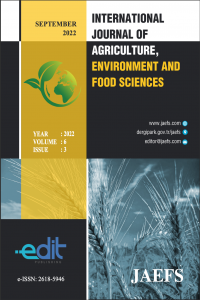Research Articles
Aim & Scope
"International Journal of Agriculture, Environment and Food Sciences" (JAEFS) is an international journal, which publishes original research articles dealing with Agriculture, Environment, and Food Sciences.
JAEFS Journal is an international, scientific, open-access periodical published in accordance with independent, unbiased, and double-blinded peer-review principles.
Journal publishes Quarterly (March, June, September, December).
The publication language of the journal is English.
A Digital Object Identifier (DOI) number has been assigned for each article accepted to be published in JAEFS.
The authors should ensure that they have written entirely original works, and if the authors have used the work and/or words of others that this has been appropriately cited or quoted.
All submissions are screened by similarity detection software.
We are using the iThenticate plagiarism solution and our maximum allowed score, for the document in which the Materials and Methods and References sections truncated, is 20%. Higher scores are not allowed and the author will be given the plagiarism report and the manuscript will be returned to the authors.
International Journal of Agriculture, Environment and Food Sciences (JAEFS) publishes high-quality original research articles on current topics in all areas of Agriculture, Environment and Food Science.
International Journal of Agriculture, Environment and Food Sciences
areas of interest include, but are not limited to:
Agricultural Engineering and Technology
Environmental Engineering and Technology
Food Engineering and Technology
Agriculture
Environment
Food
Agriculture History
Agricultural Economics
Agronomy
Animal Sciences
Aquaculture
Biochemistry
Biotechnology
Bioinformatics and Data Science
Crop Science
Dairy Science
Extension Science and Education
Entomology
Environmental Science
Fish and Fisheries
Food Processing
Food Chemistry
Food Culture
Food Health and Nutrition
Food History
Food Industry Development
Food Marketing
Food Policy and Practices
Food Safety
Forestry
Horticulture
Information Technologies and Systems
Irrigation
Molecular Biology
Organic Agriculture
Plant Physiology
Plant Breeding
Plant Protection
Plant Sciences
Precision Agriculture
Rural Development and Policy
Sustainable Agriculture
Soil Science
Plant Nutrition
Energy Crops
Veterinary
Water Resources
Author Guidelines
Ethical Principles and Publication Policy
ETHIC RULES AND PLAGIARISM
Price Policy
• All articles in the "International Journal of Agriculture, Environment and Food Sciences" (e-ISSN: 2618-5946) are published in the full open access model.
• In order to start the evaluation process of the articles sent to the International Journal of Agriculture, Environment and Food Sciences, an Article processing charge (APC) will be requested.
• Authors pay a one-time Article Processing Charge (APC) to cover the costs of peer review administration and management, professional production of articles in PDF and other formats, and dissemination of published papers in various venues, in addition to other publishing functions. Please note that the option to process an advance payment remains but does not guarantee acceptance of manuscripts.
• This fee will be requested regardless of the acceptance/rejection condition of the article.
• The payment receipt should be sent to editor@jaefs.com or WhatsApp (+90.532.5450720) number.
Article Processing Charge (APC)
300 TL (for Turkish authors)
30 USD (for foreign authors)
International Journal of Agriculture, Environment and Food Sciences
Payment Information
Vakıfbank
USD IBAN: TR78 0001 5001 5804 8020 9287 30
Swift Code (BIC Code): TVBATR2A
TL IBAN: TR75 0001 5001 5800 7315 2696 94
Payee's name: EDİT TEKNOLOJİ ARGE SANAYİ VE TİCARET LİMİTED ŞİRKETİ
Payment Description: JAEFS Article ID number
Garanti BBVA
USD IBAN: TR75 0006 2001 6420 0009 0965 51
Swift Code (BIC Code): TGBATRIS
TL IBAN: TR09 0006 2001 6420 0006 2981 25
Payee's name: EDİT TEKNOLOJİ ARGE SANAYİ VE TİCARET LİMİTED ŞİRKETİ
Payment Description: JAEFS Article ID number
The International Journal of Agriculture, Environment and Food Sciences content is licensed under a Creative Commons Attribution-NonCommercial (CC BY-NC) 4.0 International License which permits third parties to share and adapt the content for non-commercial purposes by giving the appropriate credit to the original work. Authors retain the copyright of their published work in the International Journal of Agriculture, Environment and Food Sciences.
Web: dergipark.org.tr/jaefs E-mail: editor@jaefs.com WhatsApp: +90 850 309 59 27


